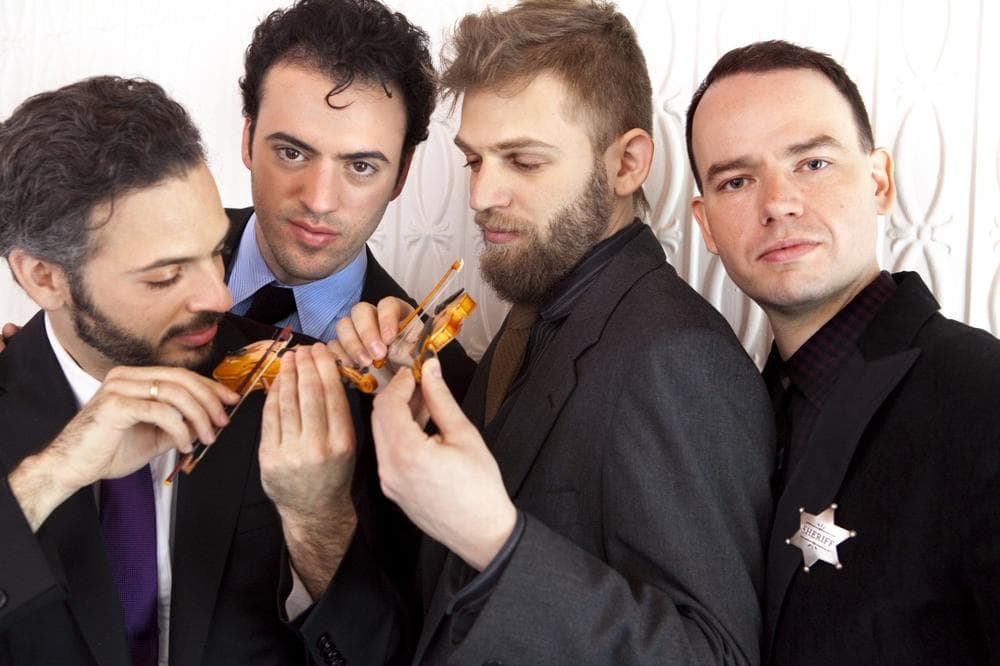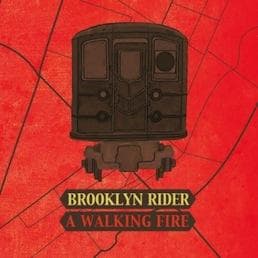Advertisement
Classical Music’s Future Sound: From Brooklyn to Persia and Beyond
The genre-bending string quartet Brooklyn Rider performed live for On Point, and talked classical music's future and the art of blending sounds from around the world.

We are at a critical moment for classical music.
Across the U.S., concert attendance is down; audiences are getting older; funding for music education and classical radio stations can be tight to say the least. In Minneapolis, the Minnesota Orchestra is entering its eighth month of ‘lockout.’ In April, Georgia's Gainesville Symphony Orchestra announced, after low funding and a lack of interest from the public, it was ending, after 30 years.
But in the face of tough times, new sounds are catching on. And one of those sounds is the group, Brooklyn Rider.
They are not your grandfather’s string quartet. NPR Music credits them with “recreating the 300-year-old form of string quartet as a vital and creative 21st-century ensemble.”

The four members – Johnny Gandelsman and Colin Jacobsen on violin; Nicholas Cords on viola; Eric Jacobsen on cello – sat down with On Point to talk about the future of classical music, finding inspiration from around the world, and their latest album "A Walking Fire".
Speaking with On Point host Tom Ashbrook, violist Nicholas Cords, described the group’s mission as a traditional chamber ensemble that often defies the tradition – blending Persian, Roma, and klezmer music with modern sound from Brooklyn – as well as where their name comes from:
NICHOLAS CORDS: A little bit of what we are trying to do, I think, is to define the string quartet as broadly as possible and use it as a place where all of our passions – our interests – in the world and in our tradition can come together. And we can put these things together in a recording or in a concert and make sense of some things that are seemingly disparate on the surface but that, kind of, come together in our world view.
TOM ASHBROOK: Brooklyn Rider. It’s an interesting name. There’s a, kind of, movement suggestion in it and it goes all the way back a century in more to Germany. What’s the predecessor that you are being inspired in your name, from?
CORDS: I mean, our name does come from the Blue Rider group. You know, the Blaue Riter – the group that was active in Munich around—before World War I, which included the likes of [Russian painter Wassily] Kandinksky and [composer] Arnold Schoenberg. And, right there is—the key to what was happening there was a multi-disciplinary group that was really visionary in their time and we just love that idea of a collective. And we find our world in Brooklyn and […] wherever we go, is a world that reflects that, kind of, collective attitude towards its making art and culture and music in the 21st Century.
Violinist Johnny Gandelsman added that part of being a modern string quartet, was acting like a modern rock band:
JOHNNY GANDELSMAN: This is something that we are trying to explore is, basically, we are acting as a band, now. So we have an in-house composer, Colin [Jacobsen], who brings a lot of new works to us […] but all of us dabble in writing or arranging. It’s, kind of, the thing that drives us and what’s really nice is not to make any separations between the world of Beethoven or Bartók and the creative process that happens within the group.
The quartet just returned from a tour through China and Hong Kong. Violinist/composer Colin Jacobsen said the group does not simply find inspiration in the music from around the world, but in the customs of different audiences from around the world:
COLIN JACOBSEN: Of course, I think audiences everywhere have different ways of—concert etiquette is just different in different places. In Asia, often, there’s a sense of incredible respect and quiet in the hall before you even go out there, you are like, “is anyone out there?” And then you get out there and people, sort of, reserve the love more towards the end of the concert, which in a certain way, we appreciate because we do think of a concert as a whole and a journey. And so, it is gratifying that people there seem to enjoy that journey.
Cellist Eric Jacobsen added that even though they tried as a string quartet to look outside of the standard repertoire, they still have a soft spot for the warhorse composers like Ludwig van Beethoven, who’s String Quartet No. 14 in C-sharp Minor played softly in the background:
ERIC JACOBSEN: I don’t think it is about breaking or keeping. I think it’s about—oh geez, when you are listening to this, it does not matter who’s recording this is, this is just some of the greatest stuff ever written. And to be able to play that and not take it for granted that we can play that, it means so much. Yeah, I don’t think it is setting any goals to break things, but it is just deciding to embrace this music, whatever it is we are playing.

Brooklyn Rider’s new album is “A Walking Fire”. They played two pieces live on our show – Ljova’s Culai: Movement #4, ‘Love Potion, Expired’ and Colin Jacobsen’s Three Miniatures for String Quartet, Movement #3, ‘A Walking Fire’ – from the album:
For the whole show, you can hear more here.
This program aired on May 2, 2013. The audio for this program is not available.